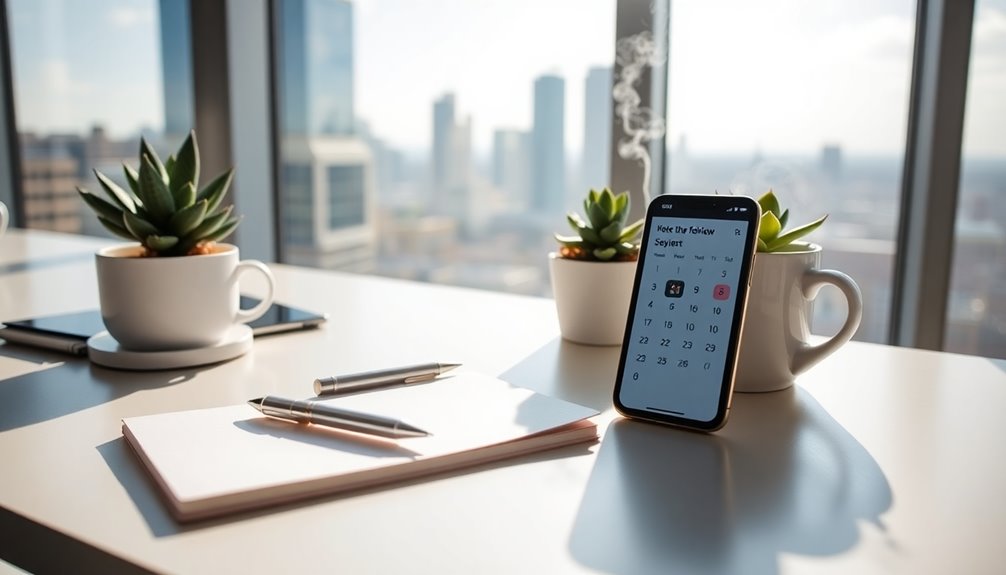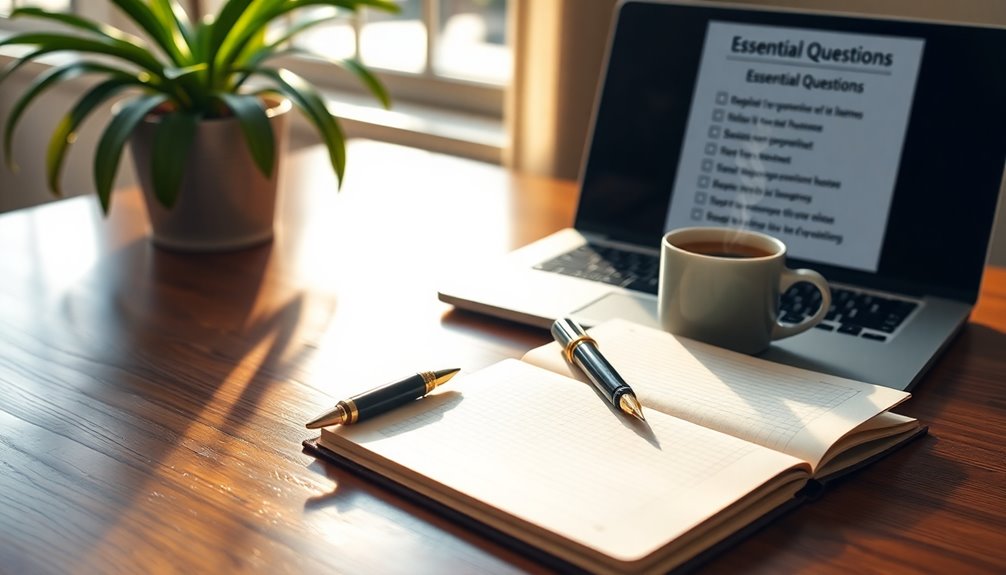Following up after a job interview is key to staying top of mind with hiring managers. Send a personalized email within 24 hours to express your enthusiasm and reference specific details from the interview. Consider a handwritten thank-you note for a personal touch. Connect on LinkedIn to maintain professional rapport and engage with their content to show ongoing interest. Regularly research the company and its culture, and keep applying to other roles to stay proactive. Practicing these strategies will not only reinforce your candidacy but also enhance your visibility as a desirable candidate for future opportunities. Discover more effective tips ahead!
Key Takeaways
- Send a personalized follow-up email within 24 hours to express gratitude and reinforce your interest in the role.
- Reference specific details from the interview to demonstrate your engagement and suitability for the position.
- Maintain regular communication with recruiters and hiring managers to keep your candidacy fresh in their minds.
- Connect on LinkedIn to foster ongoing relationships and stay visible within the company's professional network.
- Share relevant industry content and engage with interviewers' posts to deepen your rapport and understanding of the organization.
Importance of Timely Follow-Up
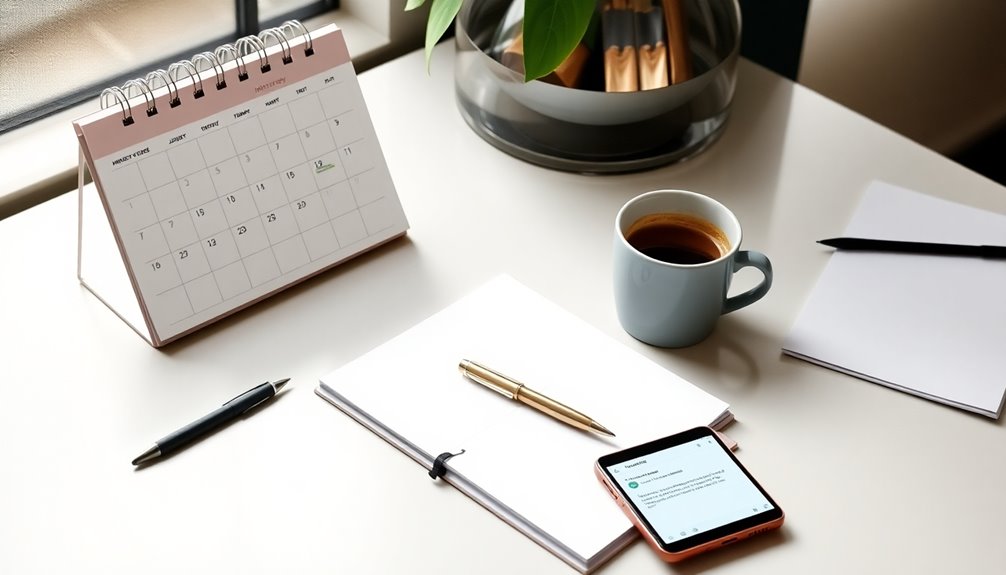
Timely follow-up after a job interview can considerably impact your chances of landing the position. Sending a follow-up email within 24 hours is vital, as research shows that 70% of employers appreciate this gesture. It demonstrates your professionalism and enthusiasm for the role. When you reach out promptly, you help keep yourself fresh in the hiring manager or recruiter's mind, which is essential in a competitive hiring process.
Delaying your follow-up can diminish its impact. A quick response reinforces your interest and shows respect for the employer's time. You want to align your follow-up with the company's hiring timeline; reaching out too soon can make you appear pushy, while waiting too long might signal disinterest.
Additionally, following up gives you the chance to clarify any points from the interview and reiterate your interest in the position, further solidifying your candidacy. For job seekers, this simple act can set you apart from other candidates. So, don't underestimate the importance of a timely follow-up; it could be the key to landing that job you desire.
Crafting Your Follow-Up Message
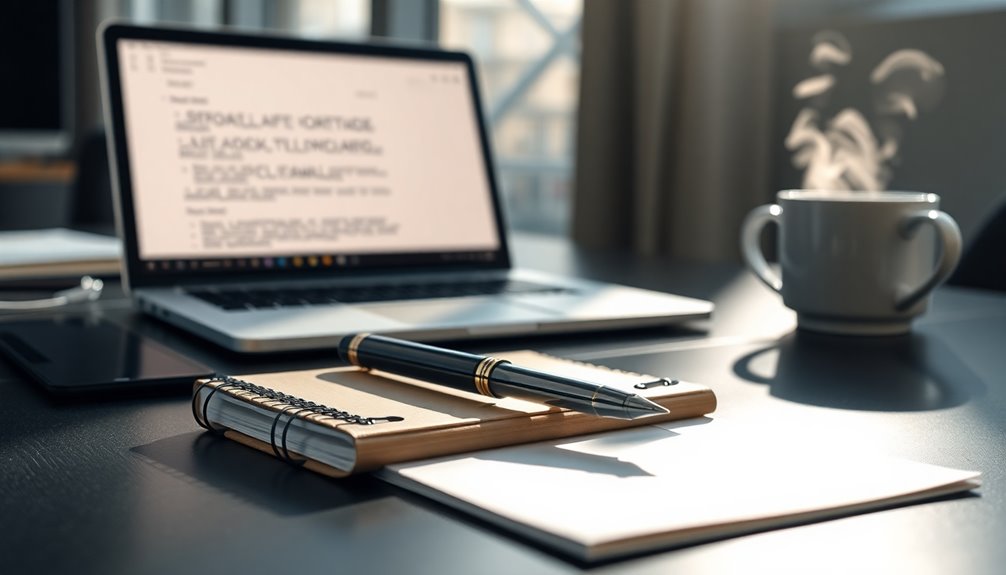
When crafting your follow-up message, make sure to personalize it by referencing specific details from your interview that stood out to you. Highlight your key qualifications that align with the role, reinforcing why you're a strong fit for the position. This approach not only shows your enthusiasm but also helps you stand out in the hiring manager's mind.
Personalize Your Message
Crafting a personalized follow-up message can greatly enhance your chances of making a memorable impression after a job interview. When you personalize your message, you're not just another candidate; you're someone who stands out to potential employers. Reference specific topics discussed during the interview, and reaffirm your interest in the role. This shows genuine enthusiasm and helps decision makers remember you.
Here's a quick table to illustrate effective personalization strategies:
| Strategy | Benefit |
|---|---|
| Mention Interview Topics | Reinforces your connection with the interviewer |
| Align Skills with Company Goals | Demonstrates your fit for the position |
| Reflect Company Culture | Strengthens your bond with the employer |
| Share New Insights | Showcases your proactive attitude |
Incorporating these elements into your follow-up email can lead to a 20% increase in response rates. Tailoring your message not only highlights your qualifications but also reflects your understanding of the company's needs. So, take the time to personalize your message—it's an essential step in your job application journey! Moreover, reflecting on past mistakes can enhance your personal growth and help you craft a more effective follow-up.
Highlight Key Qualifications
Highlighting key qualifications in your follow-up message can make a significant difference in how you're perceived by potential employers. By explicitly mentioning qualifications that align with the job description, you reinforce your suitability for the role. Here's how to effectively highlight your key qualifications:
- Use specific examples: Reference unique strengths from your interview that demonstrate your value.
- Incorporate achievements: Share relevant metrics or accomplishments that showcase your past successes.
- Tailor your message: Reflect on the employer's needs or challenges mentioned during the interview.
In your thank you note, reiterate your enthusiasm for the position and connect your qualifications to the company's goals or values. This not only shows your continued interest but also emphasizes how you can contribute to their success.
As you discuss Next Steps, make sure you clearly convey how your skills and experiences align with the job. You want to leave employers with a strong impression of your capabilities and fit for the role, ensuring they remember you long after the interview. By highlighting key qualifications, you pave the way for a favorable response.
Types of Follow-Up Communication
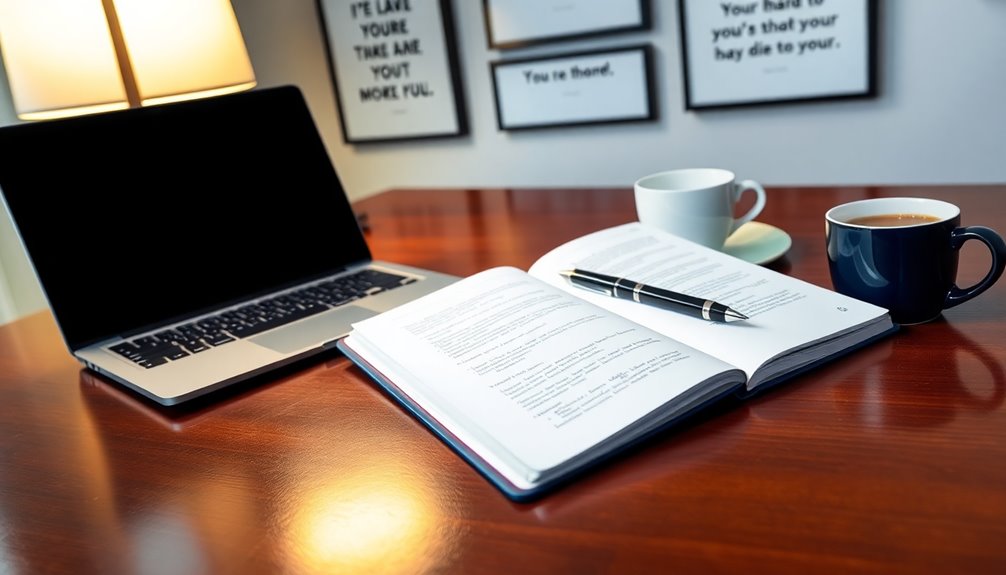
While choosing the right method for follow-up communication after a job interview is crucial, it's important to reflect on the preferences discussed during your meeting. Email remains the most common and preferred method for follow-up. It allows you to quickly express your gratitude and reinforce your interest in the position. A well-crafted email thanking the hiring managers can effectively keep you on their radar.
If you want to stand out, consider sending a handwritten thank-you note. While it may take longer to arrive, this personal touch can leave a lasting impression. However, be mindful of timing and delivery.
Follow-up calls can also be effective, but approach them with caution. Be certain you're respectful of the hiring managers' time and avoid being intrusive or overly persistent.
Additionally, don't forget the power of LinkedIn. After your interview, connect on LinkedIn with the hiring managers or team members. This informal follow-up can foster ongoing engagement and show your genuine interest in the company.
Ultimately, tailor your follow-up method based on the conversation you had during the interview. This shows professionalism and respect for their communication preferences.
Networking After the Interview

After your interview, connecting with your interviewers on LinkedIn is a smart move. It helps you maintain professional relationships and keeps you in the loop about company updates. This visibility can open doors to future opportunities you might not have known about otherwise. Additionally, establishing strong communication skills can enhance your chances of making a lasting impression.
Connect on LinkedIn
In the days following your job interview, connecting on LinkedIn can be a powerful move to solidify your professional relationship with the interviewer. It not only helps you maintain a positive rapport but also shows your appreciation for the opportunity. Here are three key points to reflect on:
- Personalize Your Request: When you connect on LinkedIn, customize your connection request to remind the interviewer of your conversation. This personal touch makes a lasting impression.
- Engage with Their Content: After connecting, engage with the interviewer's posts. Commenting or sharing their content can help you stay top of mind throughout the hiring process.
- Optimize Your Profile: Verify your LinkedIn profile highlights relevant skills and experiences. A well-optimized profile attracts attention from recruiters and increases your chances of future opportunities.
Maintain Professional Relationships
Building and maintaining professional relationships after a job interview is essential for your career growth. To keep your connections alive, start by connecting with interviewers and relevant employees on LinkedIn. This opens up lines of communication and shows your continued interest in the company. You should also attend company events or webinars, as this allows you to engage with team members and gain insights into the company culture, further strengthening those professional ties.
Don't forget to share relevant industry content on social media and engage with the company's posts. This keeps you visible and showcases your enthusiasm for the organization. Additionally, consider requesting informational interviews with current employees. These conversations can deepen your understanding of the organization and help build rapport, which may lead to valuable feedback or potential job opportunities.
Finally, maintain regular, yet respectful, communication with recruiters and hiring managers. A thoughtful follow-up every few weeks can express your ongoing interest and reinforce your candidacy for future roles. By actively engaging in these practices, you'll cultivate a strong network that may benefit your career in the long run.
Continuous Company Research
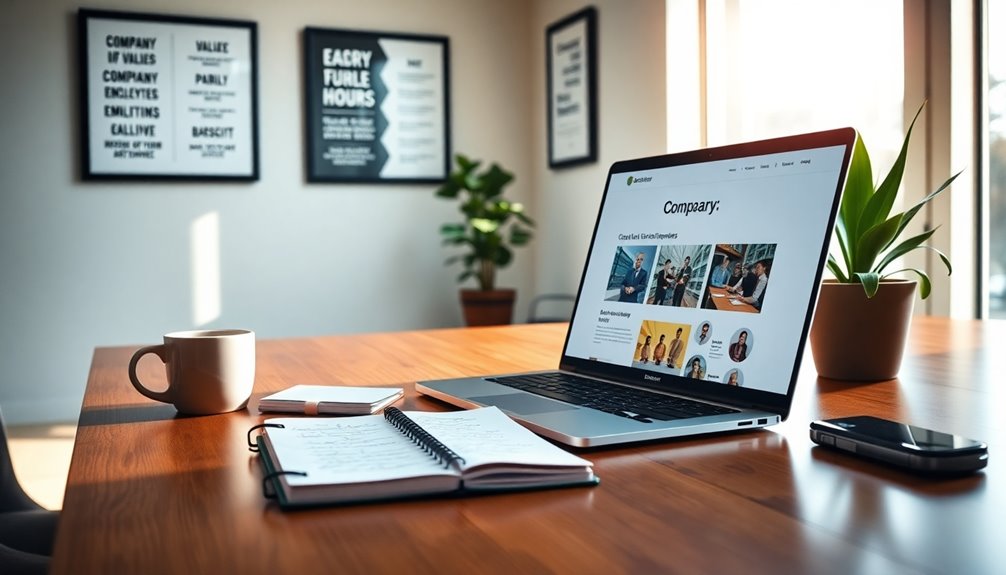
Staying on top of your target company's latest developments can considerably enhance your follow-up discussions. When you show that you're informed about what's happening, it demonstrates genuine interest and engagement. Here are some steps you can take:
- Monitor press releases: Keep an eye on announcements about new projects or initiatives.
- Engage on Social Media: Follow the company on platforms like LinkedIn and Twitter for insights into their culture and values.
- Research key executives: Knowing who leads the company and their strategic goals can help you tailor your messages.
Maintaining a Positive Attitude

Keeping up with company developments is just one part of the job search journey. Maintaining a positive attitude is equally important. Optimism can greatly enhance your mental well-being and overall job outcomes. When you approach interviews with confidence and positivity, you're more likely to leave a lasting impression on employers.
| Positive Mindset Benefits | How to Cultivate It |
|---|---|
| Boosts resilience | Focus on strengths |
| Enhances motivation | Set small goals |
| Reduces stress | Practice gratitude |
Recognize that delays in the hiring process often stem from factors beyond your control. Instead of stressing about when you might hear back, channel that energy into taking the time to refine your skills or expand your network. Sending a thoughtful connection request to someone in your industry can open new doors and maintain engagement. Additionally, incorporating nighttime meditation into your routine can help further reduce stress and improve your mental clarity during the job search process.
Engaging on Social Media

Engaging with a company's social media can greatly boost your job search efforts. When you actively participate, you demonstrate genuine interest, which 70% of employers appreciate. Here are three ways to effectively engage:
- Share relevant industry content on your personal platforms to position yourself as a thought leader.
- Connect with employees on LinkedIn to build rapport and gain insights into the company culture.
- Participate in industry discussions on LinkedIn to expand your network and uncover unadvertised job opportunities.
By engaging on social media, you not only enhance your visibility but also show that you're the best candidate for the role. Remember, it's not just about posting; it's about fostering connections that add a human touch to your job search. When you engage thoughtfully, you can enjoy meaningful interactions that might lead to a call or email about your next job.
Additionally, maintaining a professional online image reinforces your candidacy, as 60% of employers research candidates' online presence. So, make the most of your social media to stand out in a crowded job market!
Staying Active in Job Search
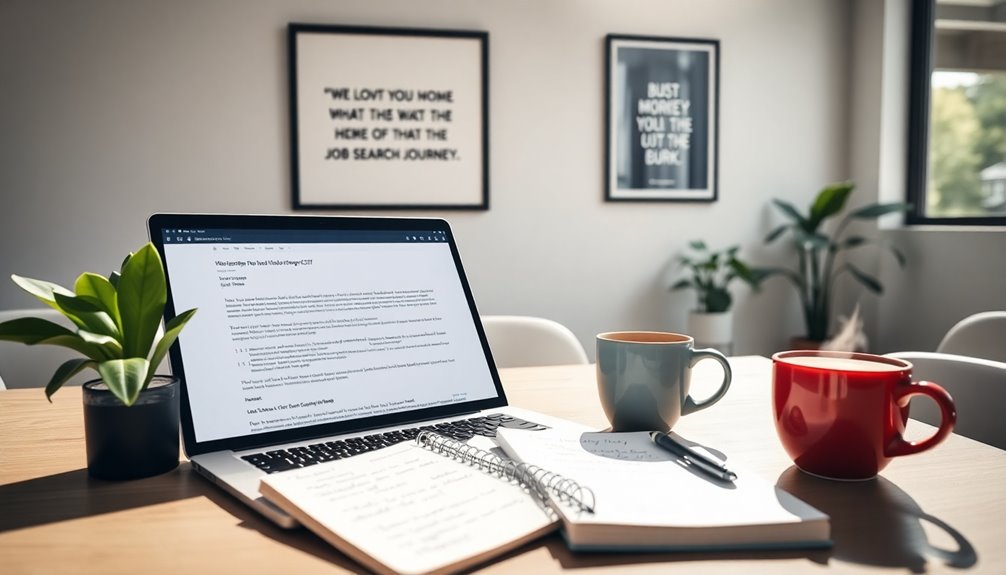
An active approach to your job search can greatly enhance your chances of landing the right position. Next, you should continuously explore new job opportunities, even after interviews. Candidates who apply to multiple positions often have a higher success rate. Pay close attention to job boards and company websites, as new openings can pop up at any time. Being among the first to apply can markedly improve your chances of being considered.
If you haven't heard back from an interview, don't hesitate to follow up. While waiting, engage in networking activities or attend industry events. Connecting with professionals on LinkedIn can lead you to unadvertised positions and valuable market insights. Additionally, consider sending multiple applications each week and set specific goals to keep your search organized. Participating in online courses or workshops can also enhance your resume, showcasing your commitment to growth. Finally, don't forget to reach out for informational interviews. It's a great way to meet people in the industry and express your interest in potential roles. Staying active in your job search will keep you top of mind for employers! Also, consider incorporating a budget plan to manage any potential expenses related to your job search effectively.
Frequently Asked Questions
How Do You Politely Follow up on a Job Interview?
To politely follow up on a job interview, send a brief email within 24 hours to thank the interviewer. Express your continued interest in the position and reference specific points discussed during the interview. If you haven't heard back after the timeframe mentioned, wait one to two weeks before sending another polite inquiry. Keep your tone professional and positive, showing your enthusiasm without being overly persistent. It'll leave a good impression!
What Are 3 Things You Should Keep in Mind During an Interview?
What's more important than first impressions during an interview? First, research the company to tailor your responses and show genuine interest. Next, prepare insightful questions that reveal your engagement and help you assess the role's fit for you. Finally, practice active listening—this not only helps you respond effectively but also builds rapport with your interviewer. Keeping these in mind can set you apart and enhance your chances of success.
What Are Simple Rules for Following up After an Interview?
When following up after an interview, keep it simple. Send a thank-you email within 24 hours to express your gratitude and interest. Personalize it by mentioning specific topics from your conversation. After that, follow up weekly or every 10 days to show ongoing interest, but don't overwhelm them. Use clear language to make your message easy to read, and track your communications to stay organized throughout the process.
How to Follow up on a Job Interview Without Sounding Desperate?
To follow up on a job interview without sounding desperate, send a brief, thoughtful email within 24 hours. Thank the interviewer for their time and express your continued interest in the position. Reference a specific conversation point to show engagement, and keep the tone polite and professional. Avoid overwhelming them with messages; instead, consider sharing an insightful article related to the industry to add value without pressure.
Conclusion
In the job hunt, a timely follow-up is your golden ticket to staying top of mind. By crafting thoughtful messages and engaging with your network, you're not just waiting for a response; you're planting seeds of connection that can blossom into opportunities. Keep your enthusiasm alive and don't underestimate the power of social media. Remember, the right job is out there, and with these strategies, you're well on your way to landing it!
